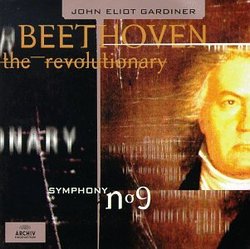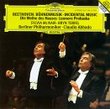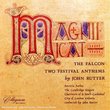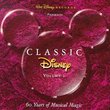| All Artists: Monteverdi Choir Title: Beethoven: Symphony No 9 /ORR * Gardiner Members Wishing: 0 Total Copies: 0 Label: Archiv Produktion Release Date: 5/14/1996 Genre: Classical Styles: Opera & Classical Vocal, Historical Periods, Classical (c.1770-1830), Symphonies Number of Discs: 1 SwapaCD Credits: 1 UPC: 028944707427 |
Search - Monteverdi Choir :: Beethoven: Symphony No 9 /ORR * Gardiner
 | Monteverdi Choir Beethoven: Symphony No 9 /ORR * Gardiner Genre: Classical
|
Larger Image |
CD DetailsSimilarly Requested CDs
|
CD ReviewsBeethoven as Beethoven would have recognized it MartinP | Nijmegen, The Netherlands | 04/16/2005 (5 out of 5 stars) "Whether you like the result or not, it is a simple fact that the authenticist Beethoven performers keep far closer to the letter of the score than their more romantically inclined colleagues, and have all historical evidence on their side too. It makes little sense to argue that Gardiner's tempos simply "feel" too fast and hurried, because this feeling is nothing but the conditioned reflex ingrained in us after years of hearing performances that were, to every likelihood, far too slow. If we complain that in this recording a sense of mystery is lacking at the beginning of the symphony, we are listening to it as if it's Bruckner (who would have written "misterioso" rather than "poco maestoso"). But Beethoven writes no tremolo, he writes rhythmically articulated triplets. And that's what Gardiner has his orchestra play. Similarly, it is pointless to claim that Beethoven would have preferred modern instruments, had he heard them. He hasn't, and he had no way of imagining them. For instance, though primitive valve horns were available in Beethoven's time, the modern horn as we know it did not become a regular presence in orchestra's until half a century after the Ninth's premiere. Early valve horns sounded much worse than natural horns, and even Brahms still preferred to have natural horns in his orchestra! One might as well include saxophones and synthesizers in the Ninth and say "Beethoven would have done so, had they been available to him". No doubt the instrumental sounds on this recording will come as a shock to some: the hoarse, fuzzy voice of the bassoon, or the nasal, plaintive wail of the oboe. And it is quite audible that negotiating the little flourish in bar 96 of the Adagio is no mean feat on a natural horn. But the audacity to stretch instruments to the limits of their possibilities are as much part of Beethoven's art of instrumentation as they are of that of Berlioz or Mahler. On modern instruments, it all becomes smooth, easy and polite, and part of the music is lost. Of course, everybody is entitled to his own taste and free to prefer, say, Böhm's much praised 1981 recording; - but to me, after having become acquainted with Norrington's and now Gardiner's lean 13-minute renderings, Böhm's 18-minute first movement does not only sound lapidary and lifeless, it simply no longer makes any sense and strikes me as rather absurd. In fact, in ignoring many indications in the text that come directly from Beethoven himself, such a performance is in a way extremely arrogant. There are only four period performances of this symphony available, as far as I know, of which those of Goodman and Brüggen never really made it into the limelight, so that Gardiner's main contender is Norrington. Their choices of tempo are generally similar, and very close to Beethoven's metronome marks (though Norrington for unclear reasons assumes that Beethoven meant dotted crotchet = 84 rather than dotted minim = 84 for the Alla Marcia in the finale, and therefore gives us twice as slow a march than Gardiner). Both have plenty energy and bite. Gardiner has the more close-up and direct recording, which can make him sound aggressive. Norrington's sound is more spacious, set in a clearer ambience, and has more detail. Also, he divides first and second violins left and right, which for unfathomable reasons Gardiner declines (it seems rather strange to go to such great lengths to realize an authentic Beethoven, and then adhere to modern orchestra seating plans). In the second half of the work my preference inclines towards Gardiner. His Adagio has more light and shade and is more poetic than Norrington's. In the finale, he simply has the better singers and the more powerfully focussed choir, who generate a final frenzy next to which Norrington sounds rather thin (though I love his pointed, explosive timpani!). My advice? Acquire either one of these, or both, but do grasp the opportunity to rinse your ears and hear some true Beethoven. " Give Gardiner a break! Yi-Peng | Singapore | 01/21/2001 (5 out of 5 stars) "This recording of Beethoven's Ninth Symphony is THE crown jewel in Gardiner's entire cycle. What people don't realise is the fact that while this is an academic exercise in itself, Gardiner manages to balance elements of authenticity and the latest scholarship with feeling and meaning. This is why I notice that the reviews seem to kick this recording about mercilessly. In fact, Gardiner, Zinman and Zander all follow the same style of performing this work. Gardiner certainly excels perfectly with his own Orchestre Revolutionaire et Romantique and his own Monteverdi Choir, and the luminous DG recording manages to help him perfectly. Gardiner's first two movements enable tensions to be built up intensely, even despite the lack of mystery at the opening of the first movement and at the fast speeds in the Trio. Everything is cleanly articulated and one feels like you are on the edge of your seat listening to this riveting recording. The slow movement brings a keen sense of repose, and gives the feeling of the slow movement in the Pastoral, and yes, one can grasp the hymnlike devotion that characterises this movement. As for the Finale, Gardiner gives an urgent, all-out and dramatic reading, eliciting an energetic sound from his choir. The soloists are all characterful, and everyone sings their heart out in Beethoven's setting which manages to do its work well even under these conditions. To wrap up, I would just like to say GIVE GARDINER A BREAK! And please don't mistreat this version at all. Scholarship aside, what an involving performance it is. You feel like one is bringing you within a hair's whisker of the "bloodthirsty beauty" of Beethoven's all-too-human music." Clean, Clean, Clean! Andrew Mayzak | Seattle, WA USA | 09/21/2006 (5 out of 5 stars) "I listened to various recordings by Solti, Von Karajan, Furtwangler, and Bernstein before settling on this one for its historical accuracy and vibrant, clean sound. While Beethoven's 9th pushed the edges of Romaticism, it is, at its core, a Classical symphony grounded in the same musical tradition as Mozart and Haydn. It should therefore be energetic, clean, and have a clear rhythmic and tonal center rather than languishing in introspective thought, drama, and dissonance... more Weber than Wagner.
In stark contrast to most recordings of the 9th, Gardiner's interpretation is quick, clean, expansive in dynamic range, and firmly rooted in Classical architecturalism. It posseses none of the Wagnerian qualities of slower recordings and, as such, delivers a roller coaster ride instead of a psychotherapy session. The Orchestra Revolutionnaire et Romantique plays with gusto, charm, and clarity on period instruments... no easy feat. The sound may be smaller than, say, the Berlin Philharmonic, but it is also more nimble and this is one of the few recordings of the 9th that makes you truly stop and listen... the cloudiness of other recordings is replaced by crisp, sharp edges and the music is infused with freshness and verve. The Monteverdi Choir sings with good diction and is a fine match for the orchestra; their dynamic range is considerable and the voice parts are well balanced. The soloists sing with passion and clarity while keeping their performances free of excessive interpretive liberties. Archiv's recording quality is first rate and there is no static, hiss, or splats on the high notes. The perfomance is recorded closely and at times, you can hear the musicians turning pages. Bernstein or Solti are good bets if you want a more distant sound... however, I think this recording is probably closest to what the Viennese heard in 1824." |

 Track Listings (5) - Disc #1
Track Listings (5) - Disc #1








